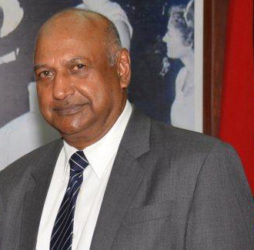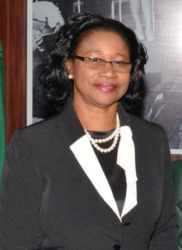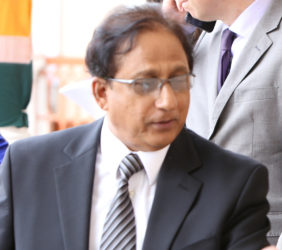The Guyana Court of Appeal by a majority decision yesterday upheld the ruling made in 2015 by former Acting Chief Justice Ian Chang that the two-term presidential limit is unconstitutional and the matter will now be taken to the Caribbean Court of Justice (CCJ).
Acting Chancellor Carl Singh, who retires today, was the first to dismiss the appeals filed by Attorney General Basil Williams SC and Attorney Roysdale Forde on behalf of the Attorney General and former Speaker of the National Assembly Raphael Trotman. Justice B S Roy later agreed with him, while Acting Chief Justice Yonette Cummings-Edwards dissented.
The original court action was brought by Cedrick Richardson, a private citizen, months before the 2015 elections. He challenged the restriction created by amendments to Article 90 of the Constitution that were enacted in 2001 after the bipartisan Constitution reform process.
On July 9, 2015, Justice Chang ruled that the presidential term-limit was unconstitutional without the approval of the people through a referendum. The amendments to Article 9 of the Constitution had seen the insertion of two clauses to allow for re-election only once.

Justice Chang’s ruling had paved the way for two-term president Bharrat Jagdeo to seek re-election. Jagdeo had repeatedly distanced himself from the case and had publicly said that he had no intention of running for office again. However, Jagdeo is now the Opposition Leader and was recently elected as General Secretary of the PPP/C. It is that party’s General Secretary who has traditionally been its presidential nominee.
Weeks after the decision was handed down, appeals were filed. The appeal was heard for the first time last month and the decision made yesterday arose out of written submissions; there were no oral submissions.

Williams, following the conclusion of the case, noted that the court was divided in its decision. “It wasn’t unanimous and I believe that we have good grounds to go to the CCJ,” he said, adding that it is important that matters like these are resolved. He stressed that when the matter was first filed in the High Court he was not the Attorney General. “I wasn’t the Attorney General in the beginning. Mr [Anil] Nandlall [the then AG] as you heard the court say didn’t raise certain points when he was supposed to, but the decision would mean that anybody can come to court and there are really no checks and balances. So the CCJ needs to address these issues,” he said.
Forde said the court had delivered a split decision, two judges to one, and he and his client remain confident in the arguments submitted and will most likely file an appeal to the CCJ.
Asked when, he responded that it will be done within the 30-day time frame permitted.
Richardson’s lawyer, Shawn Allicock, in an invited comment, expressed satisfaction with the court’s decision. He said the matter was really about the democratic rights of citizens of Guyana. He made mention of a petition filed where the democratic right to be belaboured with a voter’s ID card in order to vote was challenged.

Asked about his level of confidence in the CCJ also upholding Justice Chang’s decision, Allicock responded, “We are confident… We wouldn’t be here [Court of Appeal] if we didn’t think that it was something that was winnable.”
He told reporters that the people of Guyana are deserving of the courts hearing these matters and deliberating on them. Noting that this matter affects all citizens, he said it was not a case where “Shawn Allicock or some citizen or one single citizen decides. It is in everybody’s interest.”
Allicock questioned what would happen if the Parliament decided that a person must be a former parliamentarian in order to be a presidential candidate. “That would mean those 65 people in Parliament have a 1 in 65 chance of becoming the next president. So tinkering with these criteria has issues,” he stressed.
The attorney said that whatever the final decision was he will accept it and all would know whether a person can serve in office for two terms or not.
Decision rests with the people
When the matter was called, Justice Singh had announced that he would speak first followed by Justice Cummings-Edwards and then Justice Roy.
Reading his ruling, which lasted for almost 90 minutes, Justice Singh expressed the view that the decision of the term limits rests with the people via a referendum and not the National Assembly.
He pointed out that Guyana can be described as a sovereign, democratic state and that democracy is a guarantee upon which the function of government in Guyana can be assessed. Noting that the facts of cases mentioned by Forde depart from the present situation, he expressed belief that in deciding this appeal the court should focus on the concepts of sovereignty and democracy as these words are used in Article 1 and 9 of the Constitution. He said that these concepts should be interpreted “with a clear understanding of the role of the citizens of Guyana in the exercise of their democratic entitlement and what is conferred upon them by virtue of the sovereignty that is vested in them.”
Justice Singh stressed that people should choose whom they “please to govern them” and noted that this is essential to all other rights.
Act No 17 of 2000 “waters down” the opportunity of the people of Guyana to elect the president of their choice though this is present in Article 1 and 9, he said.
Article 90 of the Constitution states at Clause 2(a) that a person elected as president after the year 2000 “is eligible for re-election only once” and at Clause (3) that a person who acceded to the presidency after the year 2000 and served therein on a single occasion for not less than such period as may be determined by the National Assembly “is eligible for election as president only once.”
Justice Singh said changes to the features of these articles could only be done via referendum; that is “by the people themselves”. He said that when the Act No 17 of 2000 “altered” the provisions of Article 90 resulting in an increase in the number and categories of disqualified persons who the political parties might have considered as their candidate, that “effectively suppressed the right of the people to freely choose those persons whom they feel should represent them”. He said that this right of the people to choose is now controlled by the National Assembly.
Justice Singh did not accept Williams’s call for the proceedings to be dismissed because of Richardson’s reference to Article 17 of 2001 which does not exist. (Article 17 of 2000 is what should have been stated.) While lauding Williams for bringing to the court’s attention what Williams called a “fatal flaw,” Justice Singh said that it was nothing more than an error. “…I would dismiss the appeal and affirm the decision of the High Court,” he stressed.
However Justice Cummings-Edwards disagreed. While speaking for approximately one hour, she expressed the view that Act No 17 of 2000 “did not require approval by referendum.” As such, she said, she upheld the validity of that Act. She said that the amendment to Article 90 was not unconstitutional as Justice Chang had pointed out. “The amendment was validly done,” she said, adding that Article 90 did not either directly or indirectly alter, dilute, affect or amend Article 1 and Article 9.
Her position is that the Act was validly passed by way of a two-thirds majority and it did not affect Articles 1 or 9 and did not require a referendum. “It is not unconstitutional. It did not diminish the democratic right of the electorate,” she expounded.
Moreover, she posited that it was Parliament that set the presidential term limit and later explained that it was the electorate who gave the National Assembly the power to amend the Constitution.
Justice Roy opted not to read a ruling. He indicated that he agreed with the position advanced by Justice Singh.
Richardson’s challenge
Richardson’s constitutional motion challenged the restriction created by amendments to Article 90 that were enacted in 2001 after the bipartisan Constitution reform process.
Richardson claimed that Act No 17 of 2001, which was passed by a two-third majority of all elected members of the National Assembly to enable the term-limits, “unconstitutionally curtails and restricts” his sovereign and democratic rights and freedom as a qualified elector “to elect the person of former president Bharrat Jagdeo” as executive president.
According to Justice Chang’s ruling, by virtue of the fact that the alterations diluted and further restricted democratic sovereignty, the holding of a referendum was required. He agreed that the changes “curtail people’s democratic choices” and offend declarations in Articles 1 and 9 that Guyana is a “democratic state” in which “sovereignty resides in the people.”
Williams, in his written submissions on appeal, which were prepared by attorney Esther Sam, contended that it was the political parties and not the electorate that choose the presidential candidate and, therefore, Richardson had no democratic right to choose who the presidential candidate will be.
Williams further contended that the alteration to Article 90 of the Constitution had not altered Articles 1 and 9 of the Constitution as alleged and therefore did not require a referendum vote.
Williams also pointed out that at all times Richardson based his application on Act No 17 of 2001, but there was no such act in place and he argued that this was a “fatal flaw in the originating summons and should have resulted in its dismissal at first instance.”
He also argued that it was clear that Article 164(2) (b) permits alterations to Article 90 once they are done in line with the prescribed procedure. This procedure, it was pointed out, requires that it be passed in the National Assembly with a two-thirds majority and referred to the electorate for a referendum vote. “However, the proviso further provides that the use of the referendum vote is not required if the alteration does not affect Articles referred to in Article 164(2) (a),” he argued.
Williams contended that the electorate had no democratic right to choose who will become the presidential candidate; instead, their right is to vote for the party list of their choice.
He further added that the amendments did not alter or change any of the provisions in Article (164) (2) (a) as alleged or at all and therefore “there is no requirement for the bill to be taken to referendum. Act No 17 of 2000 is therefore not ultra vires the Constitution since the alteration was done in compliance with Article 164(2) (b) of the Constitution.”
Addressing whether Richardson had any standing to bring the application, Williams said that while it was based on the ground that his right to choose the presidential candidate of his choice was being affected by the constitutional alteration to Article 90, the law states clearly that an electorate does not have the right to choose or vote for a presidential candidate.
Williams also considered whether an originating summons was the appropriate process for instituting the proceedings before the court. He argued that Richardson had not established the legal requirements to bring the application by way of originating summons and in fact “ought to have approached the High Court for constitutional relief by way of writ of summons since it is not an allegation of a breach of a fundamental right.”
Forde, in a submission on behalf of Trotman, asked that the appeal be allowed as the amendments to Article 90 did not “expressly, or by implication or infection alter the provisions of Articles 1 and 9 of the Constitution.”
In his written submissions, dated January 20, he highlighted dozens of issues arising from Justice Chang’s judgement.
He noted that the appeal before the court raised issues of construction of the Constitution for the court’s determination; that is, whether in substance and effect the amendments to Article 90 altered the provisions in Articles 1 and 9 other than in accordance with Article 164 (2) (a).
Like Williams, Forde contended that the amendments did not alter by implication or affect Articles 1 and 9.
It was also argued that the amendments merely added disqualifications in respect of an individual citizen’s competence to be elected as president. “The constitutional and statutory context in which the citizen and/or the respondent exercises his right to elect a person of his own choosing as president was not considered by the Chief Justice at all in his judgment,” the submission stated.
It added that the right of Richardson as a citizen to choose or elect a presidential candidate in every elections prior to Act No 17 is the same and exact right which existed after the enactment of that Act.
According to the submission, the addition of the term limit in Article 90 did not result in the creation of a “new thing or destroy the identity of the thing affected, that is another type of state, nor was it a change in or modification or variation in the state of Guyana or the sovereignty of the people.”
